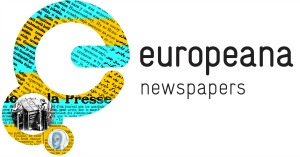Every month we highlight one partner of the Europeana Newspapers Project. These articles will give you the ‘inside story’ about our partners, their specific role within the project and the various challenges that arise with the refinement and aggregation of historical newspapers. This month we feature the National Library of Austria.

The National Library of Austria and its newspapers collection.
The history of the Austrian National Library is strongly connected to the Habsburg court. As successor to the Court Library, its beginnings can be found in the 14th century. Historians see 1368 as the founding date, since the existence of the collection’s oldest book can be proved for this year. The Austrian National Library comprises about 10 million objects spread over various collections – valuable papyri and historic globes as well as maps or a special collection on planned languages. It is Austria’s legal deposit library, the country’s largest library as well as the central scientific library. But as an institution preserving the cultural heritage it reaches out to the public as well; through exhibitions and four museums attached to the library. The library’s ancient history is also represented by architecture. The stunning baroque State Hall (Prunksaal) is amongst the world’s most beautiful historic libraries and a formidable tourist attraction.
Newspapers are collected as part of the library’s legal obligations. The collection reflects Austria’s eventful history quite well. Periodicals and papers published in different territories ruled by the Habsburg dynasty can be found just as the first modern newspapers in Greek language or Brazilian newspapers published during the time when Maria Leopoldina of Habsburg was Empress consort of Brazil.
Digitisation of newspapers and its impact on the Austrian National Library

Newspapers are versatile sources for a variety of research questions – from demographics to genealogy, from price indices to themes and topics surrounding everyday life. But newspapers as a source can offer even more: Due to the short life span of the medium, reports and articles capture contemporary reactions to an event. Hence these can serve as new and fruitful angle on certain historical questions.
Digitisation of newspapers also brings about the advantage of improving the preservation of originals. Paper quality is often poor and in many cases only limited usage is allowed due to conservation issues. Therefore digital versions allow for broader public access while easing the pressure on originals.
Apart from those advantages mentioned above, newspaper digitisation serves also to improve the completeness of collections. It is almost impossible to store every published issue of a daily newspaper over decades or in some cases even centuries. Digitisation enables libraries to fill the blank spaces of their collections by co-operations with other institutions, hence offering more complete collections of newspapers than single libraries on their own.
In 2003 the Austrian National Library’s digital newspaper reading room ANNO – AustriaN Newspapers Online – went online. So far some 600 newspapers and magazines have been made accessible, containing some 11.5 million pages. An average of about 2000 readers utilizes the online portal daily. The high rate of usage shows that ANNO is very well received by the public. Research has also shown that a wide range of topics is accessed, thus indicating the widespread interest in historical newspapers. Being part of the Europeana Newspaper project allows us to provide our users with OCR-ed full text and therefore increase usability and accessibility. As a consequence, a first version of full-text search for ANNO went online about a year ago.
The Austrian National Library’s role in the Europeana Newspapers Project

The Austrian National Library provides about 1.6 million OCR-ed pages and metadata of about 6 million pages to the project, thus making the library a major content provider within the project partners. So far nearly 1.4 million OCR-ed pages have been prepared and work on the allocation of the lacking material is carried out at the moment.
Vienna was also the venue of the annual meeting in 2014 (See: fourth newsletter for more information). An information day is planned as well in which more details of Europeana Newspapers will be presented to the interested public.
Not only Austrian newspapers will be provided by the Austrian National Library but also German-speaking newspapers published in regions of the former Habsburg Empire such as the ‘Agramer Zeitung’ published in Zagreb or the ‘Pester Lloyd’ of Budapest as well as newspapers in other languages, thus reflecting the country’s history in a central European setting.
For us the main challenge was the sheer scale of the project. To reach such an ambitious goal as collecting millions of newspaper pages requires a comprehensive approach, covering not only technical aspects but for example copyright issues as well. Being able to offer full text search to our reader is a step into the library’s future and we are keen to see how the public is using this tool.
